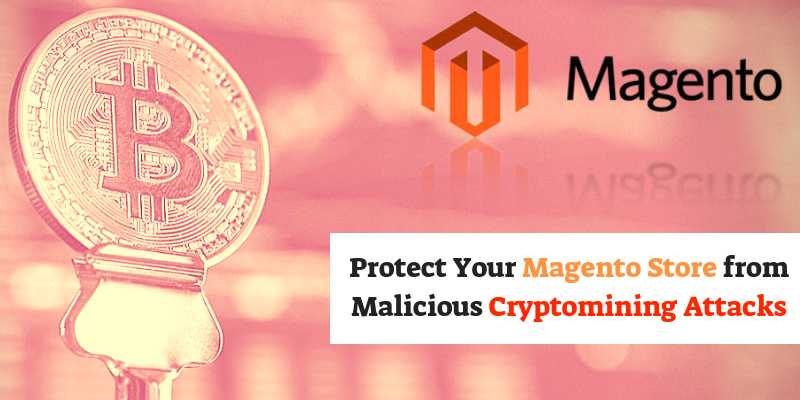
Protect Your Magento Store from Malicious Cryptomining Attacks
Have you noticed recently that your Magento store is running slow? This may be a sign that your site is infected and these days it seems doubly true. The reason behind it is malicious cryptomining.
Ecommerce websites carry out lots of transactions related to finance and it also handles personal data of your customers. If you are a retailer and have an online store, then the safety of your store should be your prime concern.
We all know that “Prevention is better than Cure.” And this is true for your Magento store also. But do you know what cryptomining is and how your website is exposed to cryptominers’ brute force attacks?
How Ecommerce Owners Can Use Cryptocurrencies and Blockchain?
Cryptomining is a process of using someone else’s computer to mine cryptocurrency like the Bitcoin. This is a new kind of malware that uses the resources of unprotected servers to generate cryptocurrencies. Instead of cashing it on computer’s horsepower, the coins are collected in another account.
So, this is like stealing your resources and making money. Of course, at times, this can happen with consent, but in most if the cases such consents are rare.
Is cryptomining really bad for your Magento ecommerce store?
Your attacker may have access to some of your most important personal data on your ecommerce store. They can use the data for various purposes and at times these attackers also hold the website owners for ransom. The payment is in the form of Bitcoins, a digital currency in order to retrieve your stored data. When the retailer pays them, they can send the decryption key so that the owner can decrypt the data.
Magento ecommerce platform is very popular and most merchants use it. Since ecommerce stores are making millions of dollars daily, they are the prime targets for the attackers.
Pretty scary! Isn’t it? To avoid such cases, Magento store owners should take some essential steps to protect their websites:
The Password: The truth is that most Magento website admins don’t even change or adjust the standard password for their accounts. The best practice is to:
- Change the password with an intricate one that consists of both numbers, alphabets and special characters.
- Not to use any identical passwords for several websites
- Not to keep or save the password on your computer.
Change the path to Admin Panel:
The standard path to the admin panel is sitename.com/admin. But Magento offers the option to adjust a default path to a custom one so that cryptominers cannot access your site easily. The steps to configure is very easy, but it is suggested to perform the change only after thorough knowledge on how to edit configuration files on the server.
Using a firewall: MySQL injection attempts are the number one threats for ecommerce stores and if the hackers are successful, they can get the access to sensitive data to your store easily.
To defend the store from such attacks, you can install a firewall application that helps to decide which data packets are safe to enter the network or not.
An encrypted connection: To save the data from being tampered, it is advised to encrypt the connection. This can be done from the Magento admin panel. For this you have to go to “Use Secure URLs’ and then enable the function.
Your website will now show a green lock symbol to the customers so that they will be sure that the site is protected and safe and no one can steal their credentials. This will also make sure that your website is compliant with GDPR standards.
Magento updates:
Magento ecommerce platform often comes up with new updates and releases and you can easily fix your issues with new features and security solutions. Keeping your site updated with the latest security releases will help you to maintain a safe and secured website.
Install adaptive filtering:
Hackers usually use malicious tactics to attack your e-store, and so it is recommended to block the hacking sources as soon as they are identified. This is known as the adaptive filtering and the step requires platform or server access, so it is usually by the hosting service provider.
If a repeated login attempt or robot like attempts are detected, the source is blocked immediately.